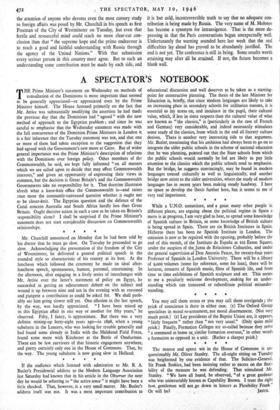A SPECTATOR'S NOTEBOOK
THE Prime Minister's statement on Wednesday on methods of consultation of the Dominions is more important than seemed to be generally appreciated—or appreciated even by the Prime Minister himself. The House fastened primarily on the fact that Mr. Attlee was substantially modifying the assertion he had made the previous day that the Dominions had " agreed " with the new method of approach to the Egyptian problem ; and since he was careful to emphasise that the Wednesday statement was made with the full concurrence of the Dominion Prime Ministers in London it is a fair inference that the Tuesday statement was not, and that one or more of them had taken exception to the suggestion that they had agreed with the Government's new move at Cairo. But of wider general importance was the Prime Minister's description of relations with the Dominions over foreign policy. Other members of the Commonwealth, he said, are kept fully informed " on all matters which we are called upon to decide that may affect Commonwealth interests," and given an opportunity of expressing their views in common, but the decision is Great Britain's and the Commonwealth Governments take no responsibility for it. That doctrine illustrates afresh what a loose-knit office the Commonwealth is—and raises once more the constantly-canvassed question whether it ought not to be closer-knit. The Egyptian question and the defence of the Canal concern Australia and South Africa hardly less than Great Britain. Ought decisive action in such a case to be taken on Britain's responsibility alone? I shall be surprised if the Prime Minister's statement does not start considerable discussion on Commonwealth relationships.


























 Previous page
Previous page